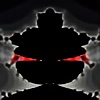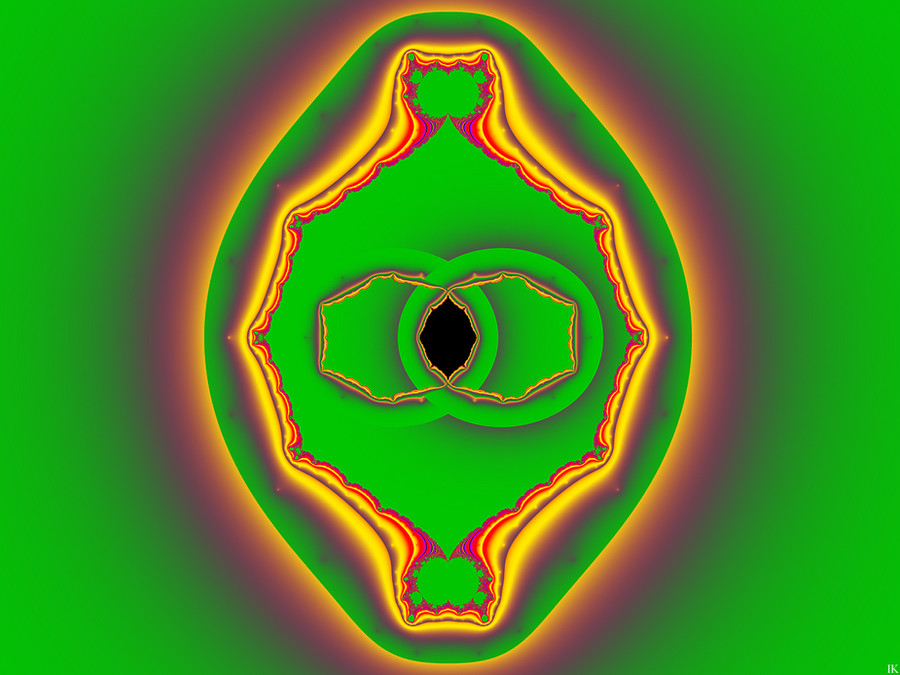HOME | DD
 FractalMonster — CCAP_CubeMinibrots
by-nc-sa
FractalMonster — CCAP_CubeMinibrots
by-nc-sa

Published: 2009-12-13 00:08:56 +0000 UTC; Views: 664; Favourites: 9; Downloads: 31
Redirect to original
Description
Download for 1280x960 resolutionThis motive is a 2D slice of the 12-dimensional









 heptic parameter space [link]
heptic parameter space [link] *a_real = #pixel (horizontal)
*a_imag = #pixel (vertical)
*b_real = 0.7
*b_imag = 0
*c_real = 0.7
*c_imag = 0
*d_real = 0
*d_imag = 0
*e_real = 0
*e_imag = 0
*f_real = 0
*f_imag = 0
This motive may not look that very beautiful. However It is a VERY interesting motive in a way I now gonna explain:
First: Take a look at my deviation [link] and maybe read the linked journal [link] too. CCAP is a special shape of cubic parameter space where 1-periodic orbits are brought out.
Second: Then take a look at Pentic-CCAP-shape [link] and maybe read the Artist’s Comments also. This is an example of a CCAP shape in pentic parameter space.
Third: Compare this deviation with [link] , the first one. What difference do you see in the outer structures? Yeah, the big difference is the mandys attached. Where in the prototype CCAP there are copies ogf the ordinary (quadratic) Mandelbrot set [link] , in this case there are copies of the cubic Mandelbrot set [link] attached




 That’s one of the new phenomena I’ve found in heptics. Of cause one can find slices containing “ordinary CCAP-shapes” also (I just now can’t tell which)
That’s one of the new phenomena I’ve found in heptics. Of cause one can find slices containing “ordinary CCAP-shapes” also (I just now can’t tell which) 




In this motive the sets M4 and M5 are coalescing and their range reaches from infinity to infinity in all directions




 The Coalescing sets M2 and M3 forms the “CCAP shape” with the cubic minibrots, as well as the very deep structures in the dots build up of enclosed Julia.like set elements and cubic minibrots among them. The set M1 is the little central black area plus the lobe to the right, whilst the set M6 is the little central black area plus the lobe to the left. The black area itself is the set which is common to ALL the six subsets, that is Heptic Connectedness Locus, the set for which all six critical points have bounded orbits and thus the set of those parameters which give rise to connected Julia sets.
The Coalescing sets M2 and M3 forms the “CCAP shape” with the cubic minibrots, as well as the very deep structures in the dots build up of enclosed Julia.like set elements and cubic minibrots among them. The set M1 is the little central black area plus the lobe to the right, whilst the set M6 is the little central black area plus the lobe to the left. The black area itself is the set which is common to ALL the six subsets, that is Heptic Connectedness Locus, the set for which all six critical points have bounded orbits and thus the set of those parameters which give rise to connected Julia sets.Instead of the basic coloring (coloring according to the number of iterations) a evaluated form called Continius Potential Method (CPM) is used. This method produces continues slopes around the sets instead of discrete plateaus.
Ultra Fractal, formula Heptic Parameterspace3 in the sp3-module written by my dear friend Stig Pettersson, Greenseng here at DeviantART. All his modules, as well as mine can be downloaded from [link]
Below the parameter file, play and have fun :
CCAP_CubeMinibrots {
fractal:
title="CCAP_CubeMinibrots" width=640 height=480 layers=1
credits="Ingvar Kullberg;12/5/2009"
layer:
caption="Background" opacity=100 method=multipass
mapping:
center=-0.666/0 magn=0.27
formula:
maxiter=1000 filename="sp3.ufm" entry="HepticParameterspace3"
p_PlottedPlane="1.(a-real,a-imag)" p_M=HCL p_SetBorders=yes
p_hide=yes p_areal=0.0 p_aimag=0.0 p_breal=0.7 p_bimag=0.0
p_creal=0.7 p_cimag=0.0 p_dreal=0.0 p_dimag=0.0 p_ereal=0.0
p_eimag=0.0 p_freal=0.0 p_fimag=0.0 p_xrot=0.0 p_yrot=0.0
p_xrott=0.0 p_yrott=0.0 p_xrotu=0.0 p_yrotu=0.0 p_xrotv=0.0
p_yrotv=0.0 p_xrotr=0.0 p_yrotr=0.0 p_xrots=0.0 p_yrots=0.0
p_xrota=0.0 p_yrota=0.0 p_xrotb=0.0 p_yrotb=0.0 p_xrotc=0.0
p_yrotc=0.0 p_xrotd=0.0 p_yrotd=0.0 p_zrot=0.0 p_LocalRot=no
p_diff=no p_bailout=100.0 p_dbailout=1E-6
inside:
transfer=none
outside:
density=0.1 transfer=linear filename="spr.ucl"
entry="ContinousPotential" p_auto=yes p_auton=2.0 p_n=1.0
p_numfact=1.0 p_scale=1.0 p_smooth=no p_epsilon=0.5 p_illustr=no
p_limiton=no p_limit=0.1 p_index3=0.0 p_index1=0.99 p_index2=0.0
p_speed=0.5 p_acc=1.0 p_clog=yes p_power=2.0 p_reversed=no p_test=no
p_testvalue=0.7 p_index4=0.29
gradient:
smooth=yes rotation=-30 index=4 color=50176 index=19 color=5063282
index=42 color=59390 index=110 color=1535 index=287 color=15335548
index=331 color=10 index=-28 color=17749
opacity:
smooth=no index=0 opacity=255
}
Related content
Comments: 12

You are right that it's very interesting Ingvar. Sometimes I wonder if there is an end in what can be found in exploring .
👍: 0 ⏩: 1

You've apparently read the comments 
..there is no end
👍: 0 ⏩: 1

It's good to know 
👍: 0 ⏩: 1

This gives space for the imagination wondering what will be next
👍: 0 ⏩: 1

This one maybe is more interesting than beautiful 
👍: 0 ⏩: 1

It was incredible! Turned my head!
👍: 0 ⏩: 1


👍: 0 ⏩: 1




























